THE ROAD NOT TAKEN कक्षा 9 अंग्रेज़ी
THEME
In the poem – ‘The Road Not Taken’, the road symbolizes our life. Poet describes his feelings about the choice that he had left in the past. The path that we choose, decides our future, our end destination. The poet says, that the path that we don’t choose in our life is ‘The road not taken'. The important message that the poet wants to give is that the choice has an impact on our future and if we make a wrong choice, we regret it but we cannot go back on it. So, we must be wise while making choices.
EXPLANATION
कविता - 'द रोड नॉट टेकन' में, सड़क हमारे जीवन का प्रतीक है। कवि उस पसंद के बारे में अपनी भावनाओं का वर्णन कर रहे है जिसे उन्होंने अतीत में छोड़ा था। जो रास्ता हमने चुना है, वही हमारा भविष्य, हमारी अंतिम मंजिल तय करता है। कवि कहते है कि हम अपने जीवन में जो रास्ता नहीं चुनते हैं, वही इस कविता का मतलब है। कवि जो महत्वपूर्ण संदेश देना चाहते है, वह यह है कि हम जो फैसले करते हैं उसका हमारे भविष्य पर प्रभाव पड़ता है और यदि हम गलत फैसले लेते हैं, तो हमें पछतावा होता है, लेकिन हम फिर उससे पीछे नहीं हट सकते। इसलिए, हमें कोई भी फैसला लेते हुए समझदारी से काम लेना चाहिए।
ABOUT THE AUTHOR
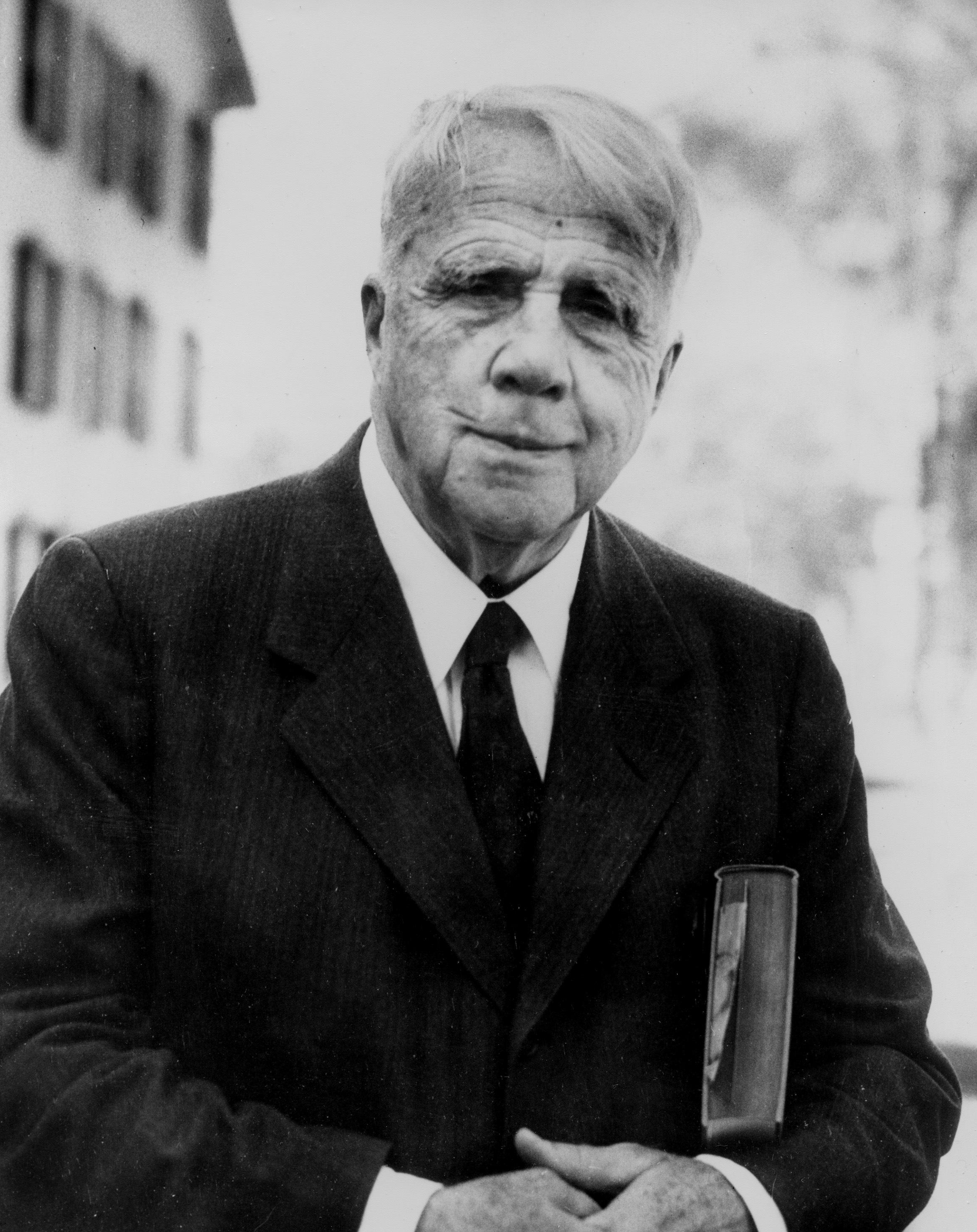
Born on March 26, 1874, Robert Frost became interested in reading and writing poetry during his adulthood. He struggled through various occupations after school working as a cobbler, editor, and teacher. 'My Butterfly' was the first poem he published in the New York newspaper 'The Independent’. He was rewarded several times for his work and he became a Public literary figure.
EXPLANATION
26 मार्च, 1874 को रॉबर्ट फ्रॉस्ट ने जन्म लिया। उनको बड़े होते- होते कविता पढ़ने और लिखने में रुचि थी। स्कूल के बाद उन्होंने विभिन्न व्यवसायों में संघर्ष किया। उन्होंने एक मोची, संपादक और शिक्षक के रूप में काम किया। 'माई बटरफ्लाई' उनकी पहली कविता थी जिसे उन्होंने न्यू यॉर्क के अखबार 'द इंडिपेंडेंट' में प्रकाशित किया था। उन्हें उनके कार्यों के लिए कई बार पुरूस्कार दिया गया और वे सार्वजनिक साहित्यकार बन गए।
STANZA 1
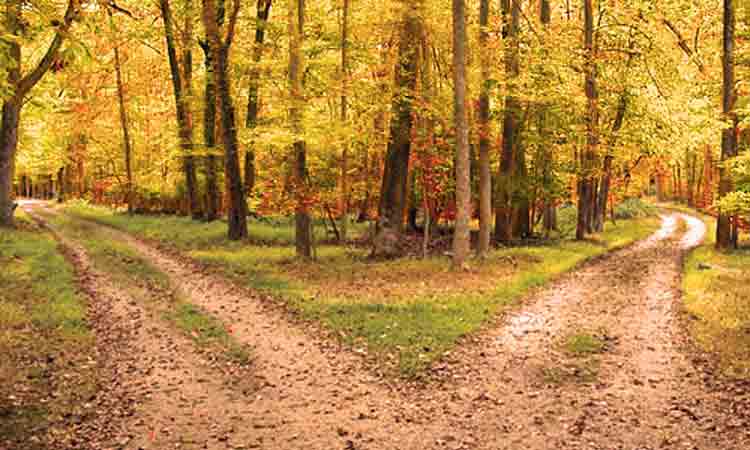
Two roads diverged in a yellow wood,
And sorry I could not travel both
And be one traveller, long I stood
And looked down one as far as I could
To where it bent in the undergrowth;
IMPORTANT WORDS
Diverged:- To separate and go in different directions, भिन्न होना या हो जाना
EXPLANATION
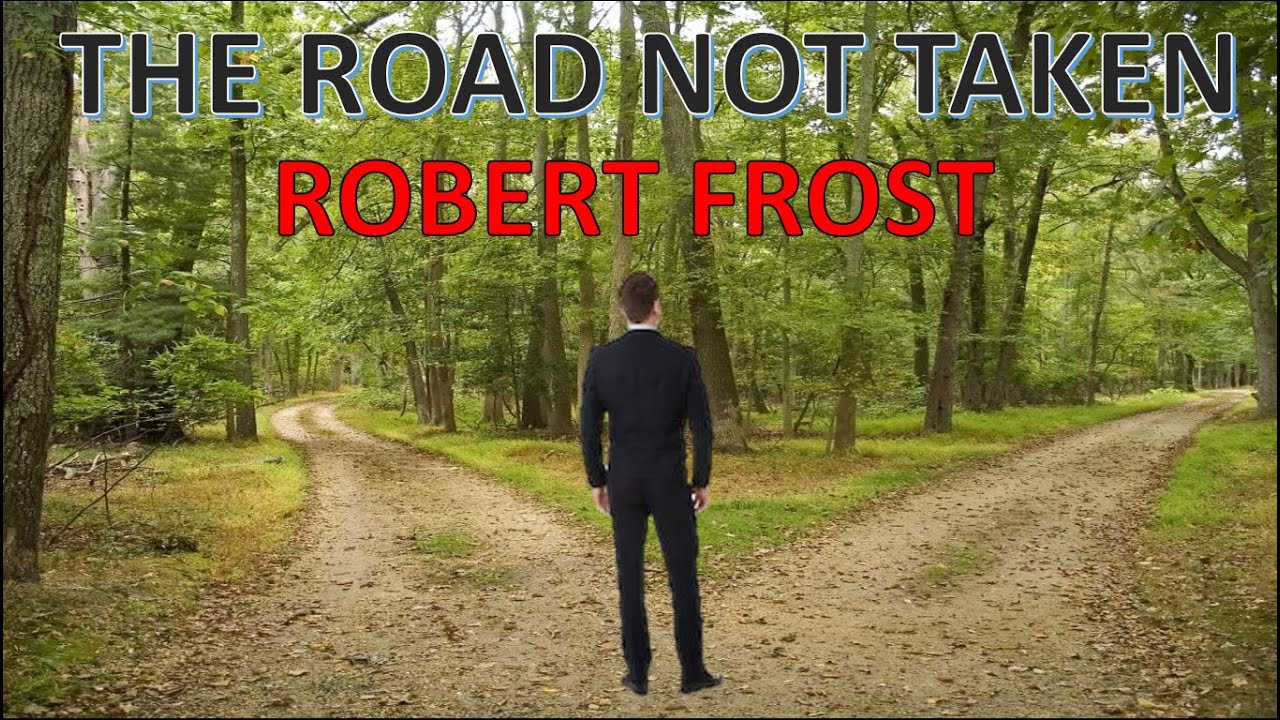
प्रस्तुत पंक्तियों में कवि रोबर्ट फ्रॉस्ट अपनी एक यात्रा का वर्णन करते हैं जिसमे वह एक घने जंगल से गुज़र रहे थे। जंगल में पेड़ो के पत्ते पीले पड़ चुके थे जिसकी वजह से जंगल पीले रंग का दिखाई दे रहा था। कवि इस घने जंगल में आगे बढ़ते जा रहे थे। और एक वक्त ऐसा आया कि जब वह रास्ता दो भागो में बट रहा था। दोनों ही रास्ते घने जंगली झाड़ियों से घिरे हुए दिखाई दे रहे थे। और ये निर्णय करना कवि के लिए बहुत ही कठिन था कि वह कौन-सा रास्ता चुने और कौन-सा नहीं क्योंकि वह केवल एक ही रास्ते पर चल सकते थे। इसलिए यह कवि के लिए दुविधा की घड़ी थी क्योंकि कवि को दोनों ही रास्ते एक जैसे लग रहे थे।
STANZA 2
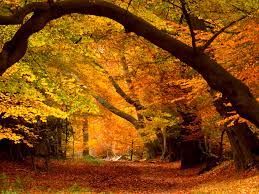
Then took the other, as just as fair,
And having perhaps the better claim,
Because it was grassy and wanted wear;
Though as for that the passing there
Had worn them really about the same
IMPORTANT WORDS
Perhaps:- May be, शायद
Claim:- To say that something is true, without having any proof, दावा
Wanted wear:- Needed to be use, उपयोग करने की आवश्यकता है
EXPLANATION
दोहराए (जहाँ से दो रास्ते बटते हो) पर खड़े होकर कवि दोनों ही रास्ते को भली भाँती देख रहे थे और यह निर्णय करते है कि वह दूसरे रास्ते से जाएंगे। और वह रास्ता कवि को अपने लिए सही लग रहा था क्योंकि उस रास्ते में अभी भी हरी-भरी घांस उगी हुई थी अर्थात उस रास्ते से अभी तक कोई गुजरा नहीं था। जबकि दूसरा रास्ता पूरा बंजर दिखाई दे रहा था अर्थात उस रास्ते से पहले यात्री गुजर चुके थे। और जब यात्री इस रास्ते से गुजर रहे थे तो उनके पैरों से घांस दब चुकी थी और इसी वजह से वह रास्ता बंजर दिखाई दे रहा था। इसलिए कवि को दूसरा रास्ता खुद के लिए बेहतर लगा क्योंकि अभी तक उस रास्ते से कोई भी यात्री नहीं गुजरा था।
STANZA 3
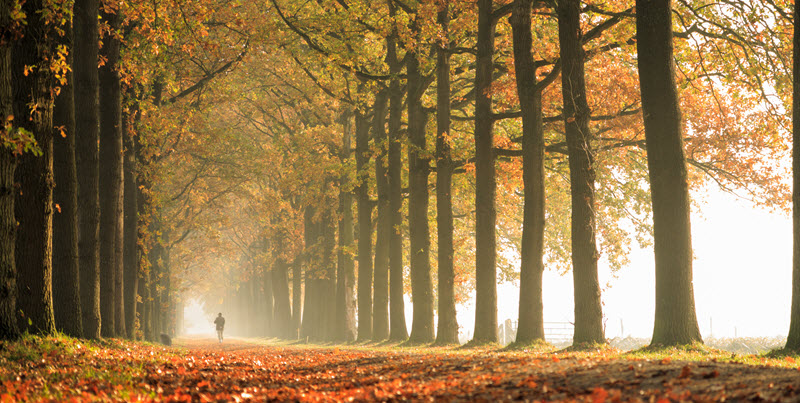
And both that morning equally lay
In leaves no step had trodden black.
Oh, I kept the first for another day!
Yet knowing how way leads on to way,
I doubted if I should ever come back
IMPORTANT WORDS
Trodden:- To press down on something with your foot, कुचलना
Doubted:- Not sure, ज़्यादा, शक, संदेह
EXPLANATION
कवि दोहराए पर खड़े होकर यह सोच ही रहे थे कि उन्हें कौन-सा रास्ता चुनना चाहिए और कौन-से रास्ते को नहीं। तभी फिर कवि इस परिणाम पर पहुँचते है कि आज वह अकेले ऐसे यात्री है जो जंगल में इतनी दूर तक पहुँच पाए है कि दोनों ही रास्तों पर ऐसे कोई पैरों के ताजा निशान अर्थात पत्तों के कुचले जाने के निशान दिखाई नहीं दे रहे हैं और फिर कवि दूसरे रास्ते पर जाने का फैसला करते हुए यह सोचते है कि वह पहले रास्ते पर फिर कभी चले जाएंगे। जबकि वह जानते थे कि वह इस जंगल में दुबारा आएँगे भी या नहीं, उन्हें खुद नहीं पता। और फिर उन्हें यह भी ज्ञात होता है कि जंगल के रास्ते भूल भुलैया की तरह होते हैं और कौन- सा रास्ता कहाँ मिलेगा किसी को नहीं पता। या फिर दोनों रास्ते आगे जाकर मिलेंगे भी या नहीं, यह भी नहीं पता। अर्थात कवि को संदेह था कि उन्हें फिर से पहली सड़क पर यात्रा करने का मौका नहीं मिलेगा।
STANZA 4
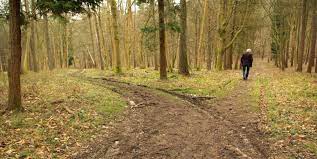
I shall be telling this with a sigh
Somewhere ages and ages hence:
Two roads diverged in a wood, and I-
I took the one less travelled by,
And that has made all the difference.
IMPORTANT WORDS
Sigh:- To let out a long, deep breath that shows you are tired, sad, disappointed, आह भरना
EXPLANATION
प्रस्तुत पंक्तियों में कवि अपने द्वारा लिए गए निर्णय का उनके भविष्य में पड़ने वाले प्रभाव के बारे में बता रहे हैं। वह कहते हैं कि उनके द्वारा दूसरे रास्ते पर चलने का निर्णय बिल्कुल भी आसान नहीं था बल्कि वह बहुत ही कठिन था। और भविष्य में जब भी वह इस घटना को याद करेंगे तो उनका मन उत्तेजना तथा चिंता से भर जाएगा क्योंकि उनके पास यह विकल्प (option) था कि वे साधारण और आसान रास्ते पर जा सकते थे फिर भी उन्होंने ऐसा रास्ता चुना जहाँ उन्हें नहीं पता था कि उन्हें कौन-सी मुश्किलों का सामना करना है। और इस निर्णय ने उनके सोचने का तरीका बदल दिया। अब उन्होंने अपने जीवन से सभी साधारण और आसान मार्ग को हटा दिया है। कवि का यहाँ मतलब है कि उस समय उन्होंने दूसरी सड़क को चुना जो मुश्किल थी और इसकी वजह से उनके जीवन में बहुत- से अंतर आए। अंततः कवि कहना चाहते हैं कि इस निर्णय ने उनके जीवन पर अच्छा प्रभाव डाला है।
POETIC DEVICE
Metaphor: A word or phrase that is used in an imaginative way to show that somebody/something has the same qualities as another thing.
Example: Fork in the road and yellow woods. The road in the poem is the metaphor of life, while the fork on the road metaphorically represents the choices we make to determine the course of our lives.
Simile: A word or phrase that compares something to something else, using the words ‘like’ or ‘as’
Example: There is one simile used in the second stanza such as "As just as fair", it shows how the poet has linked the road less taken to the easy way through life.
Personification: Personification means giving an object or animal human characteristics to create interesting imagery.
Example: Poet has personified road in the third line of the second stanza "Because it was grassy and wanted wear". Here, it is stated because it was grassy and wanted wear as if the road is human, and that it wants to wear.
SUMMARY
QUESTIONS ANSWERS
Q1. Write the symbols that are used in the poem to represent the following ideas.
(a) Choice of two options
Answer. Two roads diverged
(b) I made a rare choice
Answer. I took the one less travelled by
(c) Equally good options
Answer. Just as fair
(d) It was tempting and needed to be tried
Answer. It was grassy and wanted wear
(e) Some other time
Answer. Another day
Q2. In which season does a greenwood turn to a yellow wood? Which stage in our life can be compared to that season?
Answer. A greenwood turns to a yellow wood in autumn. The stage in our life that can be compared to that season is middle age.
Q3. Why did the traveller choose the road less travelled? What attribute of the traveller does it bring out?
Answer. The traveller selected the lesser-traveled road since it appeared to be just as excellent as the other and he believed it needed to be taken. The traveller appears to be daring. He is a free thinker who does not want to be influenced by what others have done.
Q4. Why does the traveller doubt that he shall ever come back?
Answer. The traveller feels that he will be so busy in his life with one thing leading to another, that he may not ever be able to come back.
Q5. If you were in the traveller’s place, which road would you choose? Justify your choice.
Answer. If I were in the traveller’s place, I would choose the road that was more travelled as it was safe because, before me, a lot of people travelled from there. I would not want to go on a strange road which many have not travelled by. I am not an adventurous person and feel that there is safety in doing what others are doing or have done.
n he asked him politely about how he got lost and whose child he was.
EXTRA QUESTION ANSWERS
Q1. Why does the poet feel sorry?
Answer. The poet is feeling sorry because he could not travel both roads.
Q2. Did the poet choose the road quickly?
Answer: The poet chose a second road after deep analysis. He looked down as far as he could and decided to move on the second path with the hope that he would come again.
Q3. Was one of the roads better than the other?
Answer: No, one road was claimed to be a better one as it was unused and grassy.
Q4. Does the poet tell us what difference it made?
Answer: The difference is that he did not choose that way of life which most people generally choose to get easy success, fame, and money in life. On the other hand, he chose the road that was “less travelled by”.
PREVIOUS YEAR QUESTIONS
Q1. Why will the choice between two roads that seem very much alike make such a big difference many years later in the life of the poet ?
Answer: A choice between two roads that seem very much alike will make such a big difference many years later in the poet’s life because this particular decision, the choice of this path will open up many different opportunities for him in the future. The decision that he now makes will influence him and his life and his rest of the decisions since the two roads are the same, they still have varied options in them.
Q2. Does the speaker feel that he has made the wrong choice in taking the road “less travelled by”? If not, why does he “sigh”? What does he regret ?
Answer: No, the speaker does not feel that he has made a wrong decision by taking the road less travelled but he does wonder what his life would have been if he had chosen the other path. The poet wanted to explore both the roads. He tells himself that he will explore one and then come back and explore the other, but he knows that he will probably be unable to do so.
Q3. What made the poet choose such a road?
Answer: The poet chose such a road because it had the grass grown there and none had travelled so far on it.
Q4. Why did the poet take the road which was less travelled by?
Answer: The poet took the road which was less travelled because he wanted to be different from others in his life.
Q5. Where does the traveller find himself and what problem does he face?
Answer: The traveller finds himself at a point where two roads diverged. His problem is to decide which road he should choose.
Q6. Discuss what these phrases mean to you.
i) A yellow wood
Answer: A forest in the autumn season.
ii) It was grassy and wanted wear
Answer: The road was grassy because it was a less travelled road. It wanted people to move on it.
iii) The passing there
Answer: It implies walking on the road.
iv) Leaves no step had trodden black
Answer: It means the leaves had not been crushed under the feet of travellers.
v) How way leads on to way
Answer: How one road leads to another
GLOSSARY
Diverged:- To separate and go in different directions, भिन्न होना या हो जाना
Perhaps:- May be, शायद
Claim:- To say that something is true, without having any proof, दावा
Wanted wear:- needed to be use, उपयोग करने की आवश्यकता है
Trodden:- To press down on something with your foot, कुचलना
Doubted:- Not sure, ज़्यादा, शक, संदेह
Sigh:- To let out a long, deep breath that shows you are tired, sad, disappointed, आह भरना